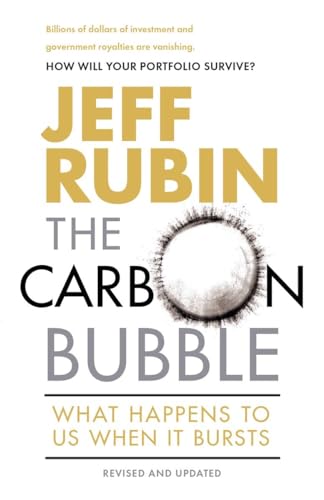
Inhaltsangabe
As the price of oil falls, bestselling author and economist Jeff Rubin takes us to the epicentre of the bursting global carbon bubble, and dares us to imagine a new engine for growth that does not run on oil.
For a decade, the vision of Canada's future as an energy superpower has driven the country's political agenda, as well as the fast-paced development of Alberta's oil sands and the push for more pipelines like Keystone XL across the continent to bring that bitumen to market. Anyone who objects to pipelines and tanker-train traffic, north or south of the US border, is labeled a dreamer, or worse—an environmentalist: someone who puts the health of the planet ahead of the economic survival of their neighbours.
In The Carbon Bubble, Jeff Rubin compellingly shows how an economic vision that rests on oil is dead wrong. Changes in energy markets in the US—where domestic production is booming while demand for oil is shrinking—are quickly turning the oil dream into an economic nightmare. Like U.S. coal stocks, the share values of oil-sands producers have been drastically reduced by falling fuel prices and are increasingly exposed to the world's efforts to reduce carbon emissions.
Rubin argues that there is a lifeline to a better future. The very climate change that will leave much of the country's carbon unburnable could at the same time make some of Canada's other resource assets more valuable: its water and its land. In tomorrow's economy, he argues, Canada won't be an energy superpower, but it has the makings of one of the world's great breadbaskets, as everything from the corn belt to viniculture heads to higher latitudes. And in the global climate that the world's carbon emissions are inexorably creating, growing food will soon be a lot more valuable than mining bitumen.
Die Inhaltsangabe kann sich auf eine andere Ausgabe dieses Titels beziehen.
Über die Autorin bzw. den Autor
JEFF RUBIN is a Canadian economist and bestselling author. A world-leading expert on trade and energy, and former chief economist and chief strategist at CIBC World Markets, he recently served as a senior fellow at the Centre for International Governance founded by Jim Balsillie. His first book, Why Your World Is About to Get a Whole Lot Smaller, was an international bestseller, and was favourably reviewed in both TIME and Newsweek. It was the number-one-selling non-fiction book in Canada and won the National Business Book Award, and was longlisted for the Financial Times and Goldman Sachs Business Book of the Year Award. Since then, he has written multiple bestsellers, including The End of Growth, The Carbon Bubble, and The Expendables.
„Über diesen Titel“ kann sich auf eine andere Ausgabe dieses Titels beziehen.
Weitere beliebte Ausgaben desselben Titels
Suchergebnisse für The Carbon Bubble: What Happens to Us When It Bursts
The Carbon Bubble: What Happens to Us When It Bursts
Anbieter: ThriftBooks-Atlanta, AUSTELL, GA, USA
Paperback. Zustand: Good. No Jacket. Pages can have notes/highlighting. Spine may show signs of wear. ~ ThriftBooks: Read More, Spend Less. Artikel-Nr. G0345814703I3N00
The Carbon Bubble : What Happens to Us When It Bursts
Anbieter: Better World Books, Mishawaka, IN, USA
Zustand: Very Good. Reprint. Former library book; may include library markings. Used book that is in excellent condition. May show signs of wear or have minor defects. Artikel-Nr. 14142787-6
The Carbon Bubble: What Happens to Us When It Bursts
Anbieter: Kennys Bookstore, Olney, MD, USA
Zustand: New. Artikel-Nr. V9780345814708
The Carbon Bubble
Anbieter: moluna, Greven, Deutschland
Kartoniert / Broschiert. Zustand: New. JEFF RUBIN is a Canadian economist and bestselling author. A world-leading expert on trade and energy, and former chief economist and chief strategist at CIBC World Markets, he recently served as a senior fellow at the Centre for International Governance fo. Artikel-Nr. 897814879
Neu kaufen
Anzahl: Mehr als 20 verfügbar
The Carbon Bubble : What Happens to Us When It Bursts
Anbieter: AHA-BUCH GmbH, Einbeck, Deutschland
Taschenbuch. Zustand: Neu. Neuware - As the price of oil falls, bestselling author and economist Jeff Rubin takes us to the epicentre of the bursting global carbon bubble, and dares us to imagine a new engine for growth that does not run on oil.For a decade, the vision of Canada's future as an energy superpower has driven the country's political agenda, as well as the fast-paced development of Alberta's oil sands and the push for more pipelines like Keystone XL across the continent to bring that bitumen to market. Anyone who objects to pipelines and tanker-train traffic, north or south of the US border, is labeled a dreamer, or worse--an environmentalist: someone who puts the health of the planet ahead of the economic survival of their neighbours. In The Carbon Bubble, Jeff Rubin compellingly shows how an economic vision that rests on oil is dead wrong. Changes in energy markets in the US--where domestic production is booming while demand for oil is shrinking--are quickly turning the oil dream into an economic nightmare. Like U.S. coal stocks, the share values of oil-sands producers have been drastically reduced by falling fuel prices and are increasingly exposed to the world's efforts to reduce carbon emissions. Rubin argues that there is a lifeline to a better future. The very climate change that will leave much of the country's carbon unburnable could at the same time make some of Canada's other resource assets more valuable: its water and its land. In tomorrow's economy, he argues, Canada won't be an energy superpower, but it has the makings of one of the world's great breadbaskets, as everything from the corn belt to viniculture heads to higher latitudes. And in the global climate that the world's carbon emissions are inexorably creating, growing food will soon be a lot more valuable than mining bitumen. Artikel-Nr. 9780345814708
Neu kaufen
Anzahl: 2 verfügbar

